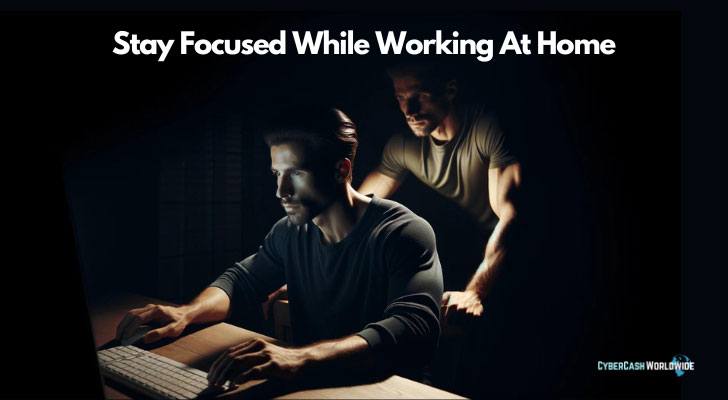Stay focused while working at home - tough enough on its own, but when you add living with a partner into the mix, things can get tricky. It’s easy to get caught up in your own world of deadlines, meetings, and projects, but you'd better treat your loved one(s) too. If you’re not careful, small irritations can build up quickly, turning work days into tension-filled experiences. Here are some ways to focus on your work without neglecting your personal relationship.
Did You Know?
- Increased Time Together: Couples working from home report spending 35% more time together daily than before the pandemic.
- Relationship Strain: Approximately 25% of people working from home feel that it has put a strain on their romantic relationships.
- Productivity Levels: 75% of remote workers claim they are equally or more productive working from home, even when they have their partner around.
- Job Satisfaction and Relationship Happiness: People with high job satisfaction are 20% more likely to report higher relationship satisfaction.
Set Clear Expectations Without Being a Dictator
When you're both at home, it's easy for boundaries to blur. Maybe your partner doesn't realize how much focus your job requires or that their friendly interruption feels like a full-on productivity killer. The first step is setting expectations, but that doesn’t mean throwing down strict rules and locking yourself away.
Instead, talk to them in a way that includes their needs too. Explain what your workday looks like and find out what they need from you. It’s about both of you having some give and take, so neither of you feels shut out.
- Have a casual chat over coffee about what your typical workday involves and what times are busiest for you.
- Ask when they need your attention or what times they want you to be more present (mealtimes, walks, etc.).
- Suggest ways you can both get what you need, like agreeing on “quiet hours” or setting a signal when you're deep into a task.
Setting these expectations ahead of time prevents miscommunication and lets your partner feel involved, not ignored.
CyberCash Wonderland
"But you said you missed me! I showered for you, Brandon! Three times! And your place smells like a rotten egg! But I deal with it, because you're not just my ATM, you're the love of my life! Don't you dare tell me you don't need me anymore... Fine! Stay with your inter-web tube then, Mr. Big Shot!"
Schedule Time for Them Like You Schedule Your Meetings
It’s easy to get lost in work, especially when you’re at home and there’s no official end to the workday. But if your partner feels like they’re second to your job, it’s going to cause friction. Instead of letting work dominate your time, schedule time for them just like you would for an important meeting.
Block out time in your day specifically for your partner. It doesn’t have to be hours on end, but small pockets of quality time can make a huge difference. Whether it’s a quick coffee break, lunch together, or a stroll around the block, it shows you’re prioritizing them, even during a busy workday.
- Put a lunch date with your partner on your calendar, just as you would a work meeting.
- Take short breaks to step out of your workspace and check in with them, even if it’s just for five minutes.
- Make a habit of ending your workday at a certain time and using that time for something fun or relaxing together.
When you deliberately carve out time for your partner, they’re less likely to feel pushed aside, and you’re more likely to focus during work hours, knowing you’ve got that time set aside later.
Did You Know?
- Physical Health: 55% of remote workers say they have more time for physical exercise, contributing to better personal well-being and potentially happier relationships.
- Mental Health Concerns: 1 in 4 remote workers report feeling lonely, which can affect their love life and relationship quality.
- Financial Savings: Couples working from home save an average of 10% of their income by cutting down on commuting and eating out, reducing financial stress.
- Increased Intimacy: About 35% of couples report an increase in intimacy and sexual frequency since working from home together.
Use Headphones as a Signal, Not a Wall
Headphones are a lifesaver when you need to zone in on work, but they can also make your partner feel like you’ve disappeared into your own world. Instead of using them to shut everything out, use them as a clear signal for when you’re in deep work mode. It’s like hanging a “do not disturb” sign without saying a word.
You don’t have to wear them all the time, but when you really need focus, popping on those headphones shows your partner that you’re temporarily unavailable for small talk or interruptions. It’s a simple but effective way to communicate without coming off as rude.
- Wear your headphones when you need to tackle intense work, but take them off during lighter tasks or breaks.
- Let your partner know that when the headphones are on, you’re in “focus mode,” and when they’re off, you’re more accessible.
- Use them strategically, so your partner doesn’t feel like they never get your attention.
This way, your partner knows when you’re really deep into work, but they also know it’s temporary, and you’re not ignoring them for hours on end.
We earn a commission if you click this link and make a purchase at no additional cost to you.
CyberCash Wonderland
"Alright, gotta head out. Closing the Miller account. Big bucks, honey. See you tonight."
"Meanwhile, I'm finalizing the web design, David. Double the traffic this month."
"Website clicks? Please. Actual work gets done in an office, Max."
"Whatever, darling. Can you give me 50 bucks? My back needs waxing."
Set Up a Work Zone That’s Separate but Not Isolated
One way to make sure you’re focusing on work without accidentally isolating yourself is to create a workspace that’s clearly defined but not completely cut off from the rest of your home. Working in a separate room with the door shut all day can make your partner feel like you’re miles away, even if you're just a few feet apart. On the other hand, trying to work from the couch next to them can be distracting for both of you.
Find a middle ground by setting up a workspace that’s separate enough for you to focus, but not so isolated that you feel disconnected. Think of it as creating your own little corner where work happens, but where your partner doesn’t feel like they’ve lost you to another world.
- Choose a spot that’s away from high-traffic areas but still within sight or earshot of your partner.
- If possible, keep the door open or work in a shared space that allows some casual interaction.
- Make your workspace feel temporary by cleaning up at the end of the day so your living area doesn’t turn into a full-time office.
This setup allows you to focus when you need to but still be part of the shared space, keeping that connection with your partner alive.
Did You Know?
- Conflicts Over Workspaces: Roughly 15% of couples report having conflicts over shared workspaces at home.
- Use of Technology for Connection: 70% of long-distance couples use video calls more frequently to maintain their relationship, a habit adopted by some cohabiting couples when working in separate spaces.
- Planning for the Future: 40% of couples working from home discuss their future more often, including career goals and personal aspirations.
Plan Something Fun at the End of the Day
No matter how well you decide, the lines between work and home life can gradually blur over time. It’s easy to keep working into the evening or feel like you're stuck in a never-ending loop of "just one more task." One way to keep things in check is to give both of you something to look forward to at the end of the day.
It doesn’t have to be a grand gesture or elaborate plan. Even something simple like cooking dinner together, watching a show, or taking a walk can create a clear division between work time and personal time.
- Plan a movie night or a favorite show to unwind together after work.
- Cook dinner together, trying out a new recipe or making it a bit of a ritual.
- Go for a walk, grab a drink, or do something relaxing that lets you both de-stress after a busy day.
By having a little reward at the end of the day, you’ll find it easier to focus during work hours because you know there's a time set aside for connection later.
Be Flexible When Things Don’t Go as Planned
Things will go wrong. Your partner might interrupt a Zoom call, or you might get sucked into a work task longer than expected. Instead of getting frustrated, being flexible will help both of you adjust to this new way of living and working together. Expect some interruptions and accept that working from home isn’t always going to be a smooth ride.
When things go off course, whether it’s your partner needing your help during the day or you getting pulled into an unexpected work crisis, staying flexible will help both of you feel like you're on the same team, rather than adversaries in a tight space.
- When work takes longer than planned, let your partner know you’ll make up the time later.
- If they interrupt during a critical moment, kindly ask them to give you a few minutes, then give them your attention once you're free.
- Be willing to adjust your workday if unexpected things come up—show your partner that you're open to their needs too.
Flexibility goes both ways, and by staying open to adjustments, you’ll keep the peace and avoid unnecessary tension.
Don't Let Work Spill Into Every Conversation
One trap people fall into when working from home is letting work become the main topic of conversation, even during personal time. While it’s normal to vent about a frustrating meeting or share an exciting update, if every conversation turns into a work discussion, your partner might feel like they're living with a coworker instead of a partner.
Make a conscious effort to shift gears when you’re off the clock. Use the time with your partner to talk about anything other than work, even if it’s something small. It helps create a mental break for both of you and keeps the relationship from becoming all work and no play.
- Ask your partner about their day or share something non-work-related that’s been on your mind.
- Play a game, listen to music, or find something light to talk about that’s totally unrelated to your job.
- Take turns deciding what to talk about during meals or downtime to keep the conversation balanced and interesting.
Keeping work out of every conversation gives your relationship room to breathe and helps maintain a healthy separation between work life and home life.
Conclusion
Working from home with a partner in the house isn’t always easy, but with a few adjustments, it’s possible to stay focused without neglecting the relationship. The key is keeping communication open, being intentional with your time, and creating a balance between work and personal life that makes sense for both of you. You don’t have to sacrifice one for the other—it just takes a bit of thoughtfulness and flexibility.






Good message well done. Thx for your advice, merry xmas. Good wishes for 2018 mate.
Thank you! Merry Christmas & a happy new year to you too! I appreciate your visit.
Ray